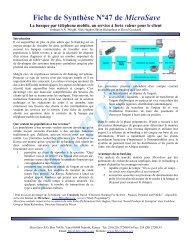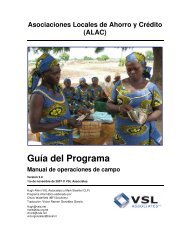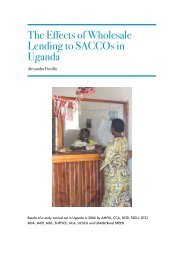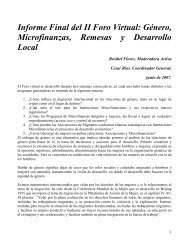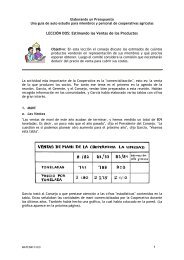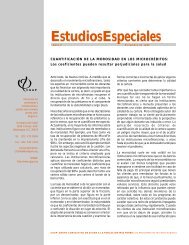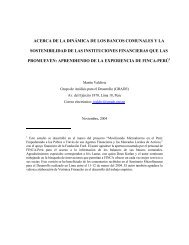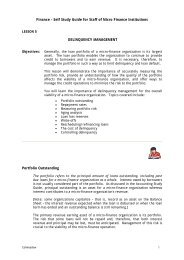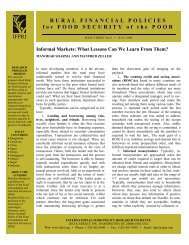review of warehouse receipt system and inventory credit initiatives in ...
review of warehouse receipt system and inventory credit initiatives in ...
review of warehouse receipt system and inventory credit initiatives in ...
You also want an ePaper? Increase the reach of your titles
YUMPU automatically turns print PDFs into web optimized ePapers that Google loves.
is an ‘<strong>in</strong> between case’; it could fit Approach 1.C s<strong>in</strong>ce State has delegated regulatory<br />
powers. However, the delegation is temporary <strong>in</strong> nature, last<strong>in</strong>g to 2011.<br />
BOX 3: FUNDING A NATIONAL REGULATORY SERVICE<br />
It is only worth establish<strong>in</strong>g a regulatory service if it can be staffed with competent <strong>and</strong> well motivated people,<br />
properly budgeted <strong>and</strong> free from unnecessary red tape. This will normally require it to be able to raise its own<br />
<strong>in</strong>come, out <strong>of</strong> fees for licens<strong>in</strong>g <strong>and</strong> other services. Self-f<strong>in</strong>anc<strong>in</strong>g though user fees frees the regulatory service<br />
from the vagaries <strong>of</strong> Government budget<strong>in</strong>g, <strong>and</strong> helps ensure its autonomy <strong>and</strong> accountability. The latter<br />
reason was particularly emphasised by an American <strong>warehouse</strong> exam<strong>in</strong>er (Ray Roy Boyd, pers. comm.) who<br />
took the view that the ability to raise user fees had kept the Federal exam<strong>in</strong>ation <strong>in</strong>dependent <strong>of</strong> political<br />
largesse <strong>and</strong> had made exam<strong>in</strong>ers accountable to the <strong>warehouse</strong> operators who paid the user fees.<br />
The annual cost <strong>of</strong> runn<strong>in</strong>g a regulatory service is likely to be well <strong>in</strong> excess <strong>of</strong> US$ 100,000 per annum,<br />
depend<strong>in</strong>g on local circumstances 28 . In addition some countries may wish to constitute an <strong>in</strong>demnity fund, on<br />
the grounds that the local <strong>in</strong>surance <strong>in</strong>dustry cannot <strong>of</strong>fer affordable or sufficiently comprehensive <strong>in</strong>surance<br />
products to cover aga<strong>in</strong>st the cost <strong>of</strong> <strong>warehouse</strong> failure. The State may constitute the fund, which is then topped<br />
up by the licensed <strong>warehouse</strong>s on pro-rata basis, accord<strong>in</strong>g to licensed storage capacity. For example, <strong>in</strong> 1999,<br />
the Bulgarian Government funded that country’s <strong>in</strong>demnity fund with an <strong>in</strong>terest-free three year loan <strong>of</strong> $2.5<br />
million.<br />
Rais<strong>in</strong>g the required user fees requires licens<strong>in</strong>g a lot <strong>of</strong> <strong>warehouse</strong> space. Let us assume for example that <strong>in</strong> a<br />
certa<strong>in</strong> country, <strong>warehouse</strong>s are hold<strong>in</strong>g maize for an average <strong>of</strong> five months, <strong>and</strong> charg<strong>in</strong>g fees <strong>of</strong> US$ 3.00 per<br />
tonne per month, <strong>and</strong> that they pay the regulatory agency US$ 0.20 per tonne per month or 6.7% <strong>of</strong> their gross<br />
revenue. We also assume that the licensed <strong>warehouse</strong>s will on average be two thirds full dur<strong>in</strong>g this period, <strong>and</strong><br />
that the budget for the regulatory agency is US$ 200,000 per annum. To recover such a budget will require that<br />
the <strong>warehouse</strong> operators have licensed capacity <strong>of</strong> 300,000 tonnes <strong>and</strong> store 200,000 tonnes <strong>of</strong> maize.<br />
The latter volumes are m<strong>in</strong>iscule for major gra<strong>in</strong> produc<strong>in</strong>g countries <strong>in</strong> North <strong>and</strong> South America, the Former<br />
Soviet Union <strong>and</strong> Europe; the cost <strong>of</strong> the service could be covered by licens<strong>in</strong>g six 50,000 tonne elevators.<br />
However these volumes are quite significant <strong>in</strong> an African country where the total maize harvest is only 2<br />
million tonnes <strong>and</strong> half <strong>of</strong> this never leaves the farm: 200,000 tonnes is 20% <strong>of</strong> the marketed crop. So far no<br />
African country has gone down the route <strong>of</strong> major gra<strong>in</strong>-produc<strong>in</strong>g States <strong>in</strong> the USA, <strong>and</strong> <strong>in</strong>sisted on<br />
m<strong>and</strong>atory licens<strong>in</strong>g <strong>of</strong> <strong>warehouse</strong>s. This raises the question as to whether there will be sufficient dem<strong>and</strong> to<br />
pay for such a service?<br />
It is <strong>in</strong> Tanzania where most has so far been achieved with this approach; comb<strong>in</strong>ed annual<br />
lend<strong>in</strong>g aga<strong>in</strong>st raw cashew nuts <strong>and</strong> c<strong>of</strong>fee is <strong>in</strong> excess <strong>of</strong> $50 million per annum. As noted<br />
earlier, the Warehouse Licens<strong>in</strong>g Board is fulfill<strong>in</strong>g an important technical role, but it is at<br />
present only register<strong>in</strong>g (not licens<strong>in</strong>g) <strong>warehouse</strong>s, <strong>and</strong> it has yet to be seen whether it will<br />
have the authority to take the necessary tough decisions such as revok<strong>in</strong>g licenses <strong>of</strong><br />
politically-connected <strong>warehouse</strong> operators.<br />
One approach to this issue is to delegate regulatory authority to a private entity that could<br />
operate with reasonable autonomy, at arms length from political processes. This th<strong>in</strong>k<strong>in</strong>g<br />
<strong>in</strong>spired the establishment <strong>of</strong> ZACA <strong>in</strong> Zambia <strong>and</strong> the delegation <strong>of</strong> the regulatory function<br />
to UCE <strong>in</strong> Ug<strong>and</strong>a. In practice this has proved difficult. In the case <strong>of</strong> Zambia, some<br />
28 When the Zambian certification agency (ZACA) was set up <strong>in</strong> 2001, it was planned as a very lean operation<br />
with two cross-tra<strong>in</strong>ed staff <strong>and</strong> a total budget <strong>of</strong> just over US$ 100,000, but by 2006 the budget for staff (<strong>of</strong><br />
which there were now n<strong>in</strong>e) was nearly US$ 160,000.<br />
38




